Army Vietnam War Hammond, IN Flight date: 05/15/24
By Al Rodriguez, Honor Flight Chicago Veteran Interview Volunteer
Bob Carnagey arrived in Vietnam during the Tet Offensive. Even though he was a non-combatant, he said death was all around him. Despite being in a war zone he found a way to help others and is proudest of his work with helping a Saigon orphanage.
Bob was born in Hammond, Indiana. He had three siblings. His father was a WWII Army veteran and his brother was a Navy veteran during the Cuban Missile Crisis in 1962. In junior high school his family moved to Calumet City, Illinois. He attended high school at Thornton Fractional North, which, because of a high census, had recently been split with newly constructed school and new rival, Thornton Fractional South in Lansing, Illinois. He graduated in 1964 and not knowing what he wanted to do he went to work as a laborer with HarbisonWalker making blast furnace bricks for the local steel mills. In January of 1965 he decided to attend college and enrolled at the University of Illinois in Champaign. A family friend told him about a job at the Inland Steel Research Department that was located at Purdue University Calumet in Hammond. This family friend told him he would help him get the job as long as he promised he would continue his education at Purdue University that was a walkway away from the job. Bob took the job and became a part time student at Purdue Calumet University.
In the spring of 1967, not being a full-time student, he received a draft notice. In August he reported to Fort Leonard Wood, Missouri for nine weeks of basic training. As Bob was putting his basic training gear away, Gene White, another recruit bunking next to him asked him where he was from. Bob told him he’s from Calumet City, Illinois, and Gene says he’s from Lansing, Illinois. When they found out that they attended rival high schools, they put away their rivalries and became good friends helping each other through basic training. They shared stories from home with Gene telling him about his new wife of three months. Their drill sergeant asked Gene and Bob to help Phillip, another trainee, to pass a critical written test needed to complete basic training. They found that Phillip’s reading skills were minimal so they decided to help him memorize the 120 questions and answers. Phillip passed the test. Bob found the physical part of basic training tough but he completed it with encouragement from Gene.
Bob was assigned to clerical AIT school and stayed at Fort Leonard Wood. In clerical training Bob met and befriended Al. During clerical training the Army asked for volunteers for Chaplain Assistants training. Al immediately put his hand up to volunteer and poked Bob to do the same, explaining that the training was at Fort Hamilton, Brooklyn NY, near his home and they would have a good time. Bob volunteered. Fort Hamilton wasn’t the usual Army Post and was pretty lenient with its personnel. Their first day, since their class members weren’t all there, they left the post without a pass and went sightseeing to Times Square. Then they went to Al’s house to get his car for future adventures.
There were 30 people in the Chaplain Assistants training. Bob said it was a glorified clerical job. In his classes he learned how to type up the Chaplain’s correspondence, reports and church bulletins. Another of his duties was to be the Chaplain’s driver so he learned how to drive a jeep. He finished his training in January 1968. He said 26 out of the 30 people who attended were sent to Vietnam. They were given two weeks before reporting for their flights to Vietnam, so most went home. Most of them went to Vietnam via San Francisco and were given travel money to get there. Bob was told to leave from Fort Dix, New Jersey, and instead of travel money he got a subway token and a bus ticket. Bob wanted to go home and since that wasn’t going to get him there, he called his dad and they made arrangements.
Bob left for Vietnam in the cold temperature of February, the plane refueled in Alaska and then in Yokota, Japan, all cold places. When the plane landed in Bien Hoa, Vietnam, the temperature was 95 and humid. He said it was quite a shock to his system. While waiting for his assignment they had him fill sand bags. He thought he was going to faint and wondered if he would make it there a year.
Bob was assigned to a Chaplain with the 1st Signal Brigade Regional Communications Group stationed at Phu Lam. His duties not only included typing reports but putting the weekly church bulletin together and supplying the music for Sunday service. He also drove the chaplain in his jeep to many military installations and to provide religious service for installations that did not have a chaplain in the Saigon area.
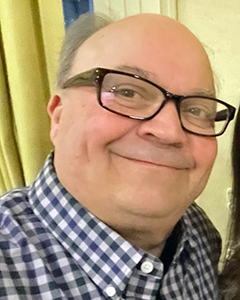
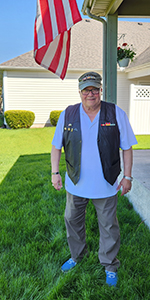
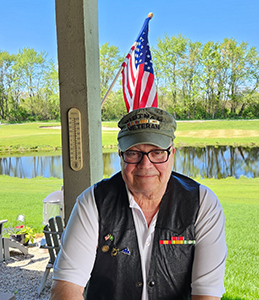
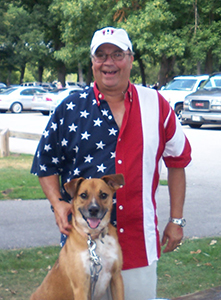
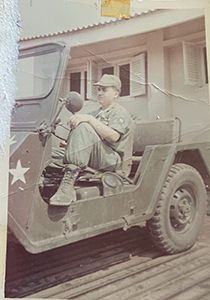
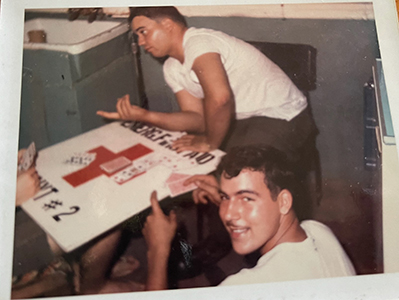
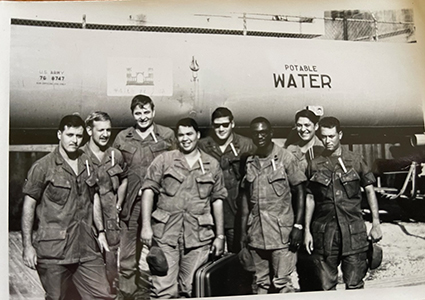
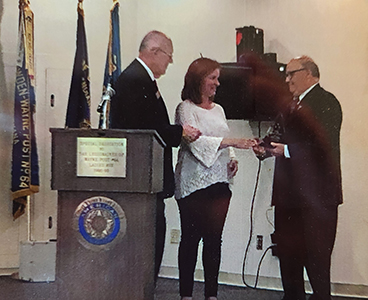
The 1st Signal Brigade was responsible for long distance communications with five centers in Vietnam using telephone switches and long lines for long distance phone calls. All telephone calls were routed through Phu Lam because it was the main switching station that directed calls to military installations and the Pentagon in the U.S. Because of the importance of this communication station, security was high and Bob had to take his turn with perimeter guard duty. Bob had a friend that was a telephone operator who told him if he ever wanted to call home he could arrange it. As Bob explained, the call would go to Hawaii and then to the U.S. In the U.S. the calls would either be forwarded or terminated because the operator there recognized that the phone number was a residential number and not a military one.
One night they took a chance and his call went through to his parents. His father would not believe that he wasn’t injured and calling from a hospital. Although Bob kept trying to explain to him that he was fine and calling from an Aid Station in Phu Lam, he never believed him. His mom didn’t care where he was calling from, she was just happy to hear his voice. Bob didn’t want to scare his parents so he never called home again.
In his first weeks at Phu Lam he went to an NCO Club where there were a group of soldiers playing cards. They asked him if he was the Chaplain’s Assistant and if he had access to his jeep. He said yes. The next week he drove them to Saigon and they pulled up to a sign-less gate. He said he was worried about the kind of place they were taking him. They knocked on the gate and were led into a compound that turned out to be a Catholic Charities orphanage run by a Vietnamese nun who they called Miss Thank You. Bob said looking around he saw about 100 kids in the courtyard. The kids seem to need attention because he was hugged by several and one grabbed his khaki hat and played keep away — a game they played every time he visited.
As he walked through the compound he saw kids with missing limbs and burn marks on their bodies. Most of the toddlers were naked from the waist down. He was surprised to see a refrigerator with a UNICEF label in the nursery. The refrigerator was full of formula for the infants. He was saddened by the condition of these kids and wrote to his parents and asked them if their church could find used clothes for the toddlers and teenagers that they could donate to the orphanage.
The word spread and many people starting donating clothes to the orphanage. Bob said he got a letter from the Tri Kappa sorority in South Bend asking what the kids needed and they started donating also. He said there were times where he was surrounded with multiple boxes of clothes addressed to him. His First Sergeant asked him if the orphanage needed food because he had a friend that was a cook in the 9th Infantry. They would get large pallets of canned foods that would never get used. Bob thought that no matter what the cans contained it would be appreciated by the kids. He had only seen big bags of rice in the food pantry. The First Sergeant acquired two M35 2 ½ ton cargo trucks with mounted M-60 machine guns and two drivers who volunteered to pick up the food. This was a risky trip just to pick up food because driving any military vehicles was a target for enemy combatants. Luckily they got there and back safely. Bob remembered them covered in red dust. Bob guided them in his jeep and the trucks followed him to the orphanage. When they got there the kids formed an assembly line and helped to unload the four pallets of food into the food pantry.
Every week his chaplain would take the weekly service money from the collection plate to headquarters in Saigon. Bob said that it never was much. One week they collected $8 to deliver to headquarters. There was a convoy going to Saigon and they joined it for protection. The convoy made a bridge crossing and Bob had to speed up to stay with them. His chaplain told him to slow down in case he got shot he didn’t want the jeep to be damaged in a crash.
Lyn Pearson was a new buddy that he met from Marion, Indiana, who arrived in Vietnam on the same day as Bob and was stationed at Phu Lam also. They became good friends. They both loved basketball and shared information from home about the basketball tournaments. Lyn was an MP and was sent to guard a mountain top signal station. This was relatively safe duty but Lyn was killed under mysterious conditions that have never been resolved. Bob was shocked to hear about his death and it still saddens him to talk about it.
When Bob got his orders to go home, his chaplain took him and a small group for French food in Saigon. While at dinner the commander of the Regional Communications Group presented him with a meritorious service Bronze Star for the work he did with the Saigon orphanage. He said his last day in Vietnam waiting for the freedom bird was the longest in his life. He survived the first and the two mini Tet Offensives but he was anxious that something was going to happen on the last day and he wouldn’t make it home. He kept saying, “come on let’s get going.” Then a plane landed and taxied towards him. Everyone waiting knew this was their ride home. 280 new men disembarked. He said it was as quiet as being in church as they walked by. Bob was happy to see that Phillip, the guy he helped in basic training was on the plane going home with him. The plane was barely airborne and he said it erupted in loud cheers as if they were at a Super Bowl game. The plane landed in San Francisco and it took 24 hours to be discharged from the Army. He caught a red eye flight that landed at O’Hare Airport at 5AM. His mom, dad and sister were waiting for him at the gate and they had a welcome home sign on the house. He said he had been up for 50 hours but it was worth it to be home. Two weeks after he got home he found out that Gene White had been killed in Vietnam. He still feels that loss today.
Bob went back to his job at Inland Steel for a few months. He was talked into working for an employment agency working on commissions. He got his first taste of salesmanship and was hooked. He’s worked as a salesman for various companies, most memorably Monroe Calculators and Bell & Howell. He joined Tandem Computers as a telecommunication salesman and then worked in high tech sales until his retirement.
Bob has been helping with veteran issues for many years. In 2013 he joined the Disabled American Veterans Chapter 17 in Hammond. He was its commander for four years and on the Board of Directors for ten. He has been an avid golfer all his life and has administered various fundraising of golf outings to help local veterans and their children. He is now the statewide Indiana DAV Commander with his term ending in 2024. Statewide there are 16,000 members. As the commander he has been able to get donations to buy vans to help transport vets to and from VA appointments. Also they were able to buy two new buses with dual wheel chair lifts for the Indiana Soldier’s Home in Lafayette. Bob volunteers with Folds of Honor. This is an organization that helps the children of veterans that were killed or injured in the Middle East. Today they help with college expenses for 4,000 children. His golf outings have contributed over $100,000. He received the Lieutenant General Timothy J. Maude AUSA award for his exceptional work with the National Guard veterans.
Bob says he’s had a great and fulfilling life. He got married in 1970. He has two sons, two granddaughters and one great granddaughter. He’s been able to help veterans. Bob was exposed to Agent Orange while in Vietnam and he’s had some health issues but they are being addressed by the VA. He’s been to D.C. but is looking forward to going on this trip with other veterans. Terri his companion will be his guardian on the flight. Terri is an employee of Mission Barbecue. He also wants to thank Honor Flight for the opportunity to tell his story. He said ‘That was the first time I ever sat down and shared my story from beginning to end. A lot of unknown stress was lifted off of me. ‘
Thank you and enjoy your day!


